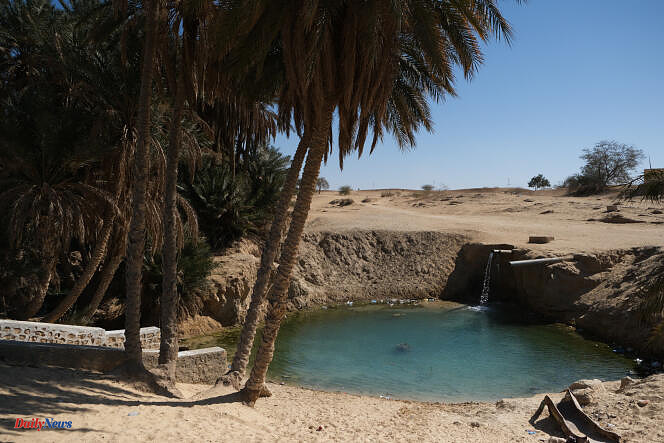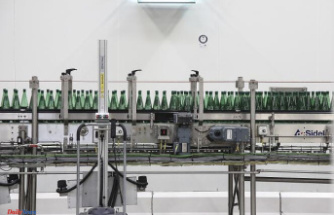The oasis of Tozeur, an island of greenery at the gateway to the Sahara, an agricultural bastion in the middle of an arid zone. Everything grows there: potatoes, onions, peppers, apples and especially dates, the beating heart of the local economy, of which Tunisia is one of the world's main exporters. The lushness of the oasis has made it a major tourist attraction. But today it is threatened by the lack of water.
At the edge of the Ras Al-Aïn spring, once a river which crossed the palm grove and now reduced to the state of a puddle fed by a borehole, the inhabitants are desolate. “At the time, the water flowed freely, everything was green, it was magnificent,” says Mohamed Jamel, a 41-year-old farmer, his eyes fixed on the arid expanse that opens up before him. The landscape has changed a lot, it’s sad. What are we going to do if there is no more water? »
In the region, the majority of natural springs have dried up over the past thirty years. The fault lies in the combined effects of excessive consumption of resources with the aim of expanding cultivable areas in the desert and the gradual replacement of the traditional oasis agricultural system on three levels – market gardening and fodder on the ground, fruit trees then palm trees above. – for the benefit of intensive date monoculture.
Review the uses
“To cover our needs, we are now obliged to pump ourselves into the ground, to fetch water from deep within,” explains Salem Ben Slama, member of the La Ruche association, which campaigns for the preservation of the oasis. “The risk of groundwater drying has thus increased considerably due to the effects of global warming which are increasingly being felt, such as the drop in precipitation and the salinization of soils,” adds Mouna Tergui, an agricultural engineer who is also a member of the association.
In Tunisia, the case of Tozeur reveals the limits of an agricultural model which has long favored market gardening and fruit crops, which are very water-intensive, intended in particular for export and which faces the drastic reduction in available hydraulic resources while the country is facing its seventh consecutive year of drought. Faced with this situation, professionals in the sector – responsible for more than 75% of the national annual consumption of water resources – are forced to adapt and review their uses, torn between technical solutions and a total overhaul of the model.
Sami – a real name –, owner of several farms and a major producer of tomatoes (2,000 tonnes exported per year), focuses on technical progress. One of its farms, located near Gabès, already operates using geothermal energy: the greenhouses are heated using hot water drawn directly from groundwater which, once cooled, is then used to irrigate cherry tomatoes grown outside. soil using a drip system. “It’s an incredible technical feat where every drop of water is optimized,” he exclaims.
“Bring in foreign currency”
In this region of southeastern Tunisia, many similar facilities have flourished in recent years thanks to the arrival of foreign investors, producing tomatoes intended mainly for the European market. “I hear the criticism, but Tunisia economically needs these exports to bring in foreign currency,” he explains. He also hopes that agro-industrial groups and seed companies, with whom he has worked for a long time, will manage to find new hybrid seeds, crosses “capable of resisting the effects of global warming and consuming less water”.
“It is true that we must look at these technological solutions and these cultural techniques which allow us to save water,” analyzes Lamia Arfa, researcher at the National Agronomic Institute of Tunis. But we must ask ourselves whether these models, which are very profitable, but also very intensive, very productive, which are mainly used to fuel exports, are sustainable from an environmental, economic and social point of view. Do we really need to grow a lot of tomatoes, a large part of which will be exported when we are short of wheat? », asks Mr. Arfa.
The country regularly faces wheat shortages as its dependence on imports has increased as annual production saw a 60% fall between 2022 and 2023, amid global supplies severely disrupted by the war in Ukraine . “We must clearly define our agricultural priorities and prioritize local, more resilient varieties intended for the national market,” insists hydrogeology researcher Radhia Essamin. Drawing from the soil cannot be a miracle solution. »
“Experimental Garden”
Faced with the lack of water and the dependence on imported agricultural fertilizers, the prices of which have also exploded in recent years on international markets, several citizen initiatives have emerged across the country to defend a return to local agriculture. In the forest of Al-Homrane, a small town perched in the middle of the mountains of western Tunisia, Mariem Baccar, Omar Ben Lamine and Slim Baccar bought agricultural land and set up their farm there almost five years ago.
The wooden sign planted in the vegetable garden warns: “Experimental garden”. They planted olive trees, tomatoes, fruit trees and wheat there, minimizing the use of water. “For example, we are doing trials to see which varieties are the most resistant to climate change and drought,” explains Mariem Baccar. The seeds are then exchanged through the Tunisian Permaculture Association of which they are members. Is their model adaptable to a larger scale? “It was already in place in the past and worked very well,” assures Mr. Ben Lamine, visibly accustomed to the issue. Given the situation, we don't really have a choice, we will have to return to this type of model. »
In Tozeur, the La Ruche association also highlights a return to the traditional oasis system "more efficient and resistant to the effects of climate change", argues Salem Ben Slama. “Our survival is at stake,” he warns. Without this, the oasis will end up drying out and its inhabitants will be forced to migrate inexorably north to be able to continue living. »












